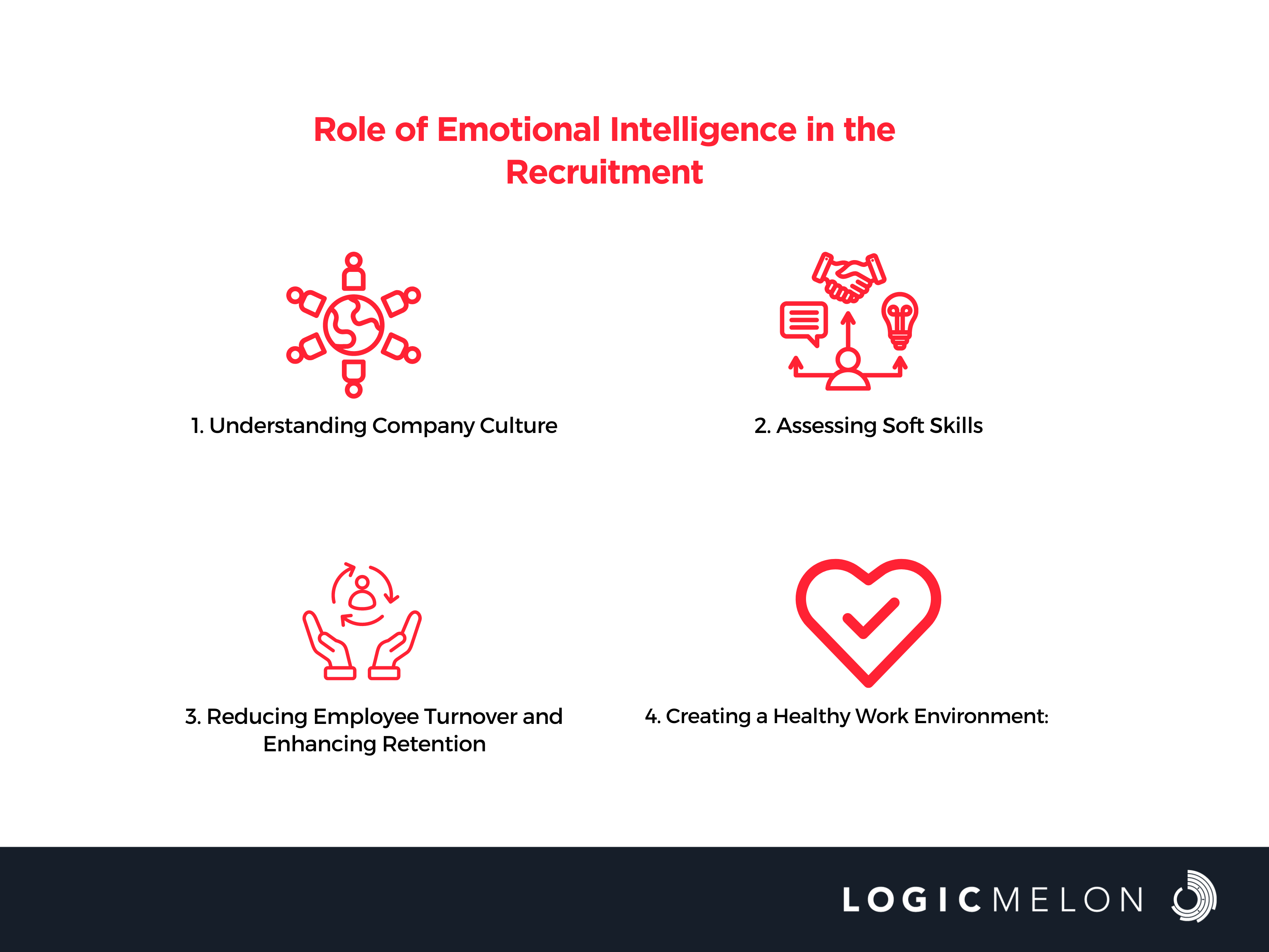Role of Emotional Intelligence in the Recruitment
In the world of recruitment finding the perfect fit for your team goes beyond just qualifications and technical skills. As hiring managers, we understand that success in today’s workplace demands something more, something special, and one of them is emotional intelligence. In this blog, we’ll explore the significance of emotional intelligence in the recruitment process and how it leads to a harmonious and productive work environment. So, get ready to embark on a journey into the world of emotions and connections!
So, here is the list of factors that emotional intelligence has in recruitment.

1. Understanding Company Culture:
Picture this: a candidate walks into the interview room, and you instantly sense a connection. That’s the magic of emotional Intelligence at play! emotional intelligence empowers recruiters to understand a candidate’s personality, helping them gauge how well they’ll fit into the company culture. emotionally intelligent individuals tend to contribute positively to team dynamics, promoting harmony and positivity among team members. With a balanced mix of logic and emotions, they make thoughtful decisions aligned with the company’s goals – a win-win for everyone!
2. Assessing Soft Skills:
The interview process – your chance to unleash your emotional intelligence detective skills! emotionally intelligent hiring managers can assess a candidate’s soft skills with finesse. 85% of career success comes from having well-developed soft skills and people skills. Communication, adaptability, and teamwork – nothing escapes their keen eye! Remember, recruitment involves working with people, so understanding a candidate’s personality is key to effective communication. Get ready to connect, engage, and decode the soft skills that make a candidate truly stand out!
3. Reducing Employee Turnover and Enhancing Retention
Cue the drums of productivity! High employee turnover? Not on our watch! emotional intelligence comes to the rescue again! When new hire clicks with the company culture, they’re more likely to stay longer. Emotionally intelligent employees foster healthy engagement, making their colleagues feel valued and cherished. Awww! And guess what? A warm and supportive work environment means fewer goodbyes and more hellos to productivity and retention!
4. Creating a Healthy Work Environment:
Step into our office, and you’ll feel the buzz of energy! Thanks to emotionally intelligent employees, our workplace is a haven of positivity. They lift spirits, boost morale, and inspire everyone around them. Conflicts? Not on their watch! These emotional intelligence champions skillfully manage emotions, defuse tense situations, and create a harmonious work environment. No wonder our team’s productivity has skyrocketed, and we’re always raring to go!
Importance of Emotional Intelligence:
Now, you might wonder – why is emotional Intelligence so crucial. Well, it’s simple – emotional intelligence influences interpersonal skills, soft skills, and overall work-culture fit. Imagine building a dream team that thrives on healthy relationships, open communication, and empathy. A team that collaborates seamlessly, resolves conflicts effortlessly, and celebrates successes together. With emotional intelligence in the picture, that dream team becomes a reality!
Ready to build a powerhouse team with emotional intelligence at its core? Thought so! emotional intelligence is a game-changer for recruitment, team dynamics, and company success. When leaders and employees have high emotional intelligence, they manage stress, nurture social connections, build strong relationships, and make sound decisions – all leading to an uber-productive and joyful work environment!
Frequently Asked Questions
1. Why does emotional intelligence matter in recruiting?
Emotional intelligence matters in recruiting because it impacts the candidate’s interpersonal skills, communication skills, and conflict-resolution abilities. It significantly impacts the success of employees during their tenure in the workplace.
2. How can employers assess emotional intelligence during the recruitment process?
Emotional intelligence can be assessed during situational interview tests, behavioural assessments, real-time example interviews, and personality tests. Observing the candidate’s reactions to challenging situations will help to get valuable insights into their emotional intelligence skills.
3. What roles benefit the most from candidates with high emotional intelligence?
Candidates with high emotional intelligence are valuable in various roles that involve teamwork, leadership, customer service, and conflict resolution. The specific roles that involve employees with high emotional intelligence include leadership, customer service representatives, human resource professionals, sales and marketing, team leaders, project managers, and conflict resolution specialists.
Grow and Thrive with Emotional Intelligence
As we journey towards a brighter and more successful future, let’s remember that Emotional intelligence plays a pivotal role in personal and professional growth. It helps us manage challenges, bounce back from setbacks, and cultivate resilience. And the best part? Emotional intelligence is a skill that can be honed and developed over time – like a superpower that’s within our grasp!
So, fellow recruiters, let’s embrace emotional intelligence in our hiring process. Let’s recognize those who connect with our company culture, possess exceptional soft skills, and are ready to rock our work environment with positivity and productivity! Together, we’ll build teams that triumph and workplaces that thrive. Cheers to Emotional intelligence, the heart and soul of recruitment success!
LogicMelon
Award-winning recruitment software that will find, attract, hire and analyse the way you want to work. At LogicMelon, we have experienced software recruitment marketing specialists to help you build effective recruitment solutions supported by the best customer service you’ll find anywhere!
Email: sales@logicmelon.com or call LogicMelon (UK) +44 (0) 203 553 3667 (USA) +1 860 269 3089
Cloud Talent Assessment: Finding the Right Fit for Your Cloud Team
Cloud talent assessments are organised to evaluate the cloud computing skills, knowledge, and capabilities of individuals or teams.
Job Market Analysis for Successful Hiring
Recruiters can attract the best candidates by conducting a comprehensive job market analysis to ensure competitiveness.
10 Candidate Assessment Methods
The objective of candidate assessment is to make an informed decision about whether the candidate is the right fit for the particular role.


